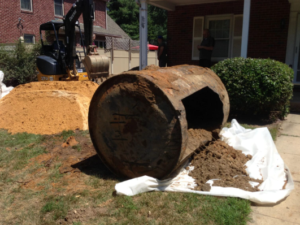What You Should Know About Oil Tanks
When buying an older home knowing the potential issues related to an oil tank is important. Oil tanks, used primarily to hold heating fuel, can pose environmental and financial problems if not properly maintained. Below are what every home buyer should know about oil tanks, above and below ground. Rooney Home Inspections offers certified home inspections to homeowners in Essex County NJ, where we are located, as well as surrounding NJ counties. We are experienced with oil tank detection and aware of local and state regulations. We can guide you through the process of finding and possibly removing an oil tank on your property. This will help to ensure that any oil tank issues are identified and taken care of.
to hold heating fuel, can pose environmental and financial problems if not properly maintained. Below are what every home buyer should know about oil tanks, above and below ground. Rooney Home Inspections offers certified home inspections to homeowners in Essex County NJ, where we are located, as well as surrounding NJ counties. We are experienced with oil tank detection and aware of local and state regulations. We can guide you through the process of finding and possibly removing an oil tank on your property. This will help to ensure that any oil tank issues are identified and taken care of.
Things To Know Regarding Oil Tanks On Your Property
1. Types of Oil Tanks and Where They Are Located
Oil tanks can be above ground, typically in basements, or outside the home. These are easier to inspect and remove. Obvious signs of leakage, rust, or damage are readily visible. Below-ground oil tanks are more of a challenge to locate and can pose greater risk if they are leaking. They are often buried in the yard and are left behind when the homeowner switches to another heating method.
2. Why Are Oil Tanks A Problem?
Oil Tanks, particularly the ones below ground, can deteriorate over time. If the deterioration leads to leakage, it can contaminate soil and groundwater, which in turn can lead to costly cleanup because of the environmental hazard. An oil tank that was not properly removed can become a liability for a homeowner when selling the home.
3. What Are Signs Of A Buried Oil Tank?
Potential evidence of a buried oil tank can be:
Old vent pipes – look for pipes protruding from the ground that are no longer connected to equipment. Often these are vent pipes from underground tanks. If copper lines run from an exterior wall into the ground, they may indicate a buried tank. During an inspection, a magnetic locator may detect buried ferrous (containing iron) metal objects, also suggesting a steel oil tank.
4. Doing Your Homework Regarding Documentation
Before buying a home, ask the seller for documentation of the presence and status of an oil tank. Ask for records showing proper oil tank removal. These would include permits, a Certificate of Approval, and a sketch of the former location of the tank. If the seller cannot provide records, contact the local municipal building. They usually keep records of permits and approvals for tank removal. You can also further check on the status of an oil tank by contacting the NJDEP for state-held records. Specific documents about an oil tank can be requested through the Open Public Records Act (OPRA). This gives the public the access to government records held by state or local agencies in New Jersey.
5. What To Do If You Suspect There Is A Buried Oil Tank
Engage a professional to perform a non-invasive oil tank sweep using magnetic locators and probes. If signs point to the presence of a buried oil tank and there are no records to be found, an exploratory dig by a licensed oil tank removal company may be necessary to confirm its presence and condition. The tank should be removed by a certified oil tank removal professional in accordance with all local and state regulations.
6. Know About The Cost and Responsibility
If a buried oil tank is discovered and needs removal or remediation the cost can be substantial. Home buyers should consider these potential expenses when negotiating the price of a home. As the new owner of a home with a buried oil tank, you could be liable for any environmental cleanup or remediation costs involved with a leaking oil tank. Be sure to address this before closing on a new home.
Always Hire A Qualified Professional
Rooney Home Inspections is a Certified Home Inspector located in Maplewood NJ. We serve the Essex County community as well as surrounding locations. We offer Oil Tank Sweep Inspections as an additional service when conducting a home inspection. For a comprehensive Oil Tank Sweep as a special service or added to a complete home inspection, call us at 973-996-8257 for a consultation.
